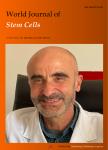Rational use of mesenchymal stem cells in the treatment of autism spectrum disorders
Rational use of mesenchymal stem cells in the treatment of autism spectrum disorders作者机构:Department of Surgery The Chinese University of Hong Kong School of Rehabilitation Kunming Medical University Department of Psychology Weifang Medical University Medical Sciences Division University of Oxford Mental Health Institute of the Second Xiangya Hospital Central South University Department of Psychiatry the University of Hong Kong State Key Laboratory of Brain and Cognitive Sciences Center for Genomic Sciences the University of Hong Kong
出 版 物:《World Journal of Stem Cells》 (世界干细胞杂志(英文版)(电子版))
年 卷 期:2019年第11卷第2期
页 面:55-72页
核心收录:
学科分类:10[医学]
基 金:Supported by National Nature Science Foundation of China No.81660381
主 题:Autism spectrum disorders Mesenchymal stem cells Major histocompatibility complex Inflammation Maternal immune activation Cell therapy
摘 要:Autism and autism spectrum disorders(ASD) refer to a range of conditions characterized by impaired social and communication skills and repetitive behaviors caused by different combinations of genetic and environmental influences. Although the pathophysiology underlying ASD is still unclear, recent evidence suggests that immune dysregulation and neuroinflammation play a role in the etiology of ASD. In particular, there is direct evidence supporting a role for maternal immune activation during prenatal life in neurodevelopmental conditions. Currently, the available options of behavioral therapies and pharmacological and supportive nutritional treatments in ASD are only symptomatic. Given the disturbing rise in the incidence of ASD, and the fact that there is no effective pharmacological therapy for ASD, there is an urgent need for new therapeutic options. Mesenchymal stem cells(MSCs) possess immunomodulatory properties that make them relevant to several diseases associated with inflammation and tissue damage. The paracrine regenerative mechanisms of MSCs are also suggested to be therapeutically beneficial for *** the underlying pathology in ASD, including immune system dysregulation and inflammation, represent potential targets for MSC therapy. This review willfocus on immune dysfunction in the pathogenesis of ASD and will further discuss the therapeutic potential for MSCs in mediating ASD-related immunological disorders.



